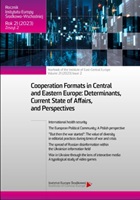Regional cooperation formats and the issue of military security of post-conflict states. Case study of the South-East European Cooperation Process
Regional cooperation formats and the issue of military security of post-conflict states. Case study of the South-East European Cooperation Process
Author(s): Paulina SzelągSubject(s): Sociology of Culture, EU-Approach / EU-Accession / EU-Development, Sociology of Politics, Geopolitics, Politics and Identity, Peace and Conflict Studies
Published by: Instytut Europy Środkowej
Keywords: The South-East European Cooperation Process; Western Balkans; post-conflict states; military security; the European Union; the North-Atlantic Treaty Organization;
Summary/Abstract: The South-East European Cooperation Process (SEECP) was launched in 1996, however, its functioning is an ongoing research phenom- enon. This regional cooperation format includes all 13 states of South-East Europe. It was established as a forum of political dialogue and consultation, where regional issues could be addressed at the highest level. One of the objectives of the SEECP was security cooperation. The aim of this article is to analyse the role of the SEECP in maintaining secu- rity in the region of the Western Balkans. This article argues that since 1996, the SEECP has been evolving and is becoming an important format of regional cooperation in South East Europe, however, it plays a limited role in maintaining the military security of the post-conflict states of the Western Balkans. From the point of view of the members of the SEECP, military security and peace could be obtained through the integration of the participants of the SEECP, in particular those located in the Western Balkans, with the European Union and the North Atlantic Treaty Organization. The article also shows that establishing the SEECP did not eliminate tensions and riots based on ethnicity in some states of the Western Balkans and so, the SEECP still has a lot to do in the matters of reconciliation and good-neighbourliness. The article is based on primary and secondary source analysis, case study method comparative analysis, and the historical method.
Journal: Rocznik Instytutu Europy Środkowo-Wschodniej
- Issue Year: 21/2023
- Issue No: 2
- Page Range: 91-107
- Page Count: 17
- Language: English

